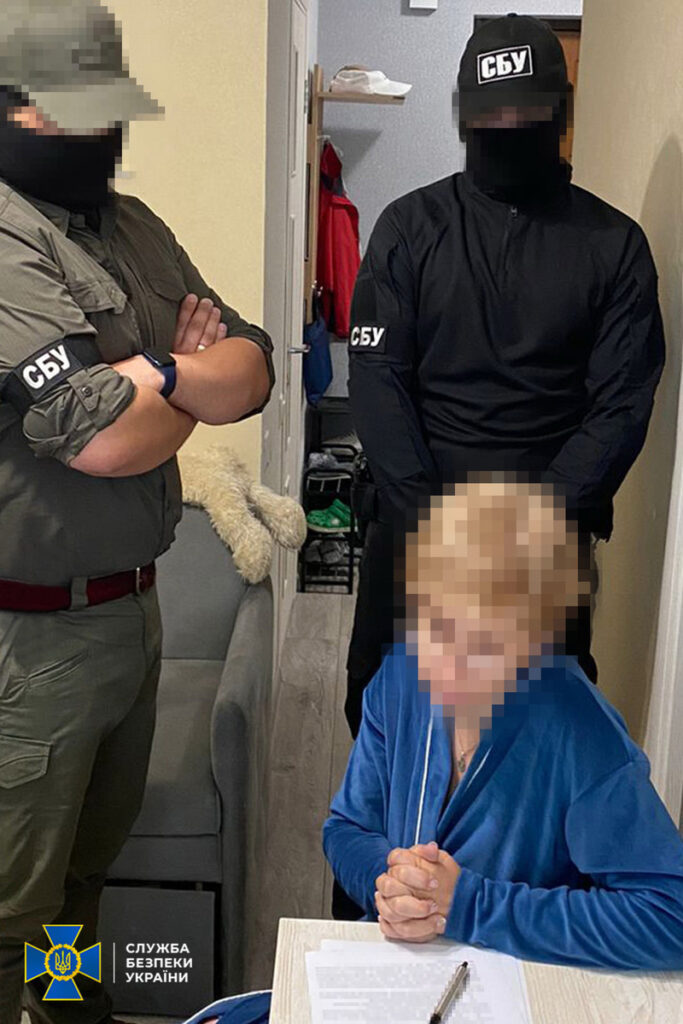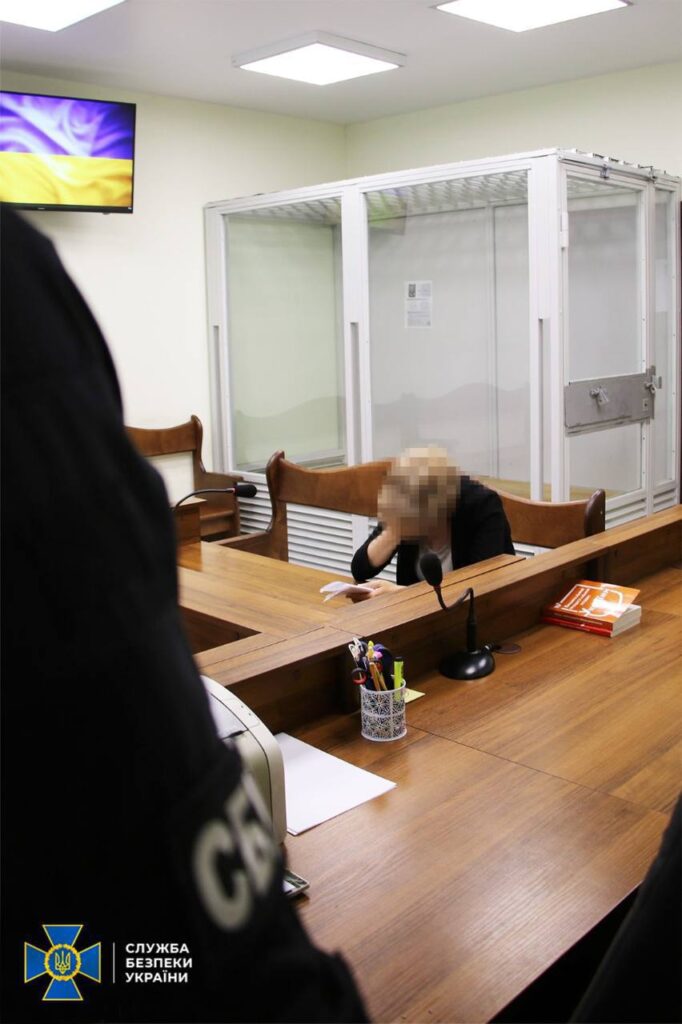Olga Molchanova, a computer science and mathematics teacher from Kupiansk, Kharkiv Oblast, faces a potential sentence of 5 to 10 years imprisonment, with a further 10 to 15-year ban from holding public office or engaging in professional activities, and with or without confiscation of property. This follows her relocation to Kyiv after the city’s recapture by Ukrainian forces in the autumn of 2022.
The Ukrainian investigation accuses Molchanova of collaborationism – under Article 111-1, Part 5, of the Ukrainian Criminal Code. This refers to a Ukrainian citizen holding a position involving organizational, managerial, or administrative functions in illegal governing bodies established in temporarily occupied territories, including the occupation administration of the aggressor state (as Russia is designated in Ukrainian law). It also includes voluntarily assuming such positions, or participating in the organization and conduct of illegal elections and/or referendums in temporarily occupied territories.

From July 19, 2021, Olga Molchanova headed the Kupiansk City Council’s Center for Professional Development of Educational Personnel in Kharkiv Oblast. Her responsibilities included establishing educational institutions, selecting and appointing their leaders, and preparing staff to meet state education standards. She continued working at the Center after the start of hostilities between Ukraine and Russia, during which Kupiansk came under de facto Russian control.
The Ukrainian investigation alleges that by continuing her work at the Center between February 27 and September 9, 2022 (before Kupiansk’s liberation), Molchanova collaborated with the occupying forces.
Her alleged assistance to the Russian authorities consisted of the fact that she continued working at the Center, where she:
- Planned the retraining of pedagogical staff according to Russian standards;
- Provided professional development training for pedagogical staff in Kupyansk Raion according to Russian standards;
- Compiled lists of pedagogical staff for training in Kursk, Russia;
- Held meetings with teachers on the implementation of Russian educational standards;
- Issued orders to subordinates regarding the performance of their professional duties.
- Participated in a meeting on the implementation of Russian educational standards as a representative of the Center in Luhansk (now part of Russia), a city that has been uncontrolled by Ukraine since 2014.
As evidence, the investigation cites data from the internet, testimony from four individuals who testified against Olga, indicating her voluntary agreement to cooperate with Russian representatives, as well as photo and video materials from the internet.
Olga was charged in June 2024—almost two years after the withdrawal of Russian troops from the Kharkiv Oblast. At that time, Olga was working as a computer science and mathematics teacher at Specialized School No. 129 in Kyiv, a school with an emphasis on English language learning. Olga was not in hiding, had registered as an internally displaced person, and had an elderly mother and a young child dependent on her.
Olga denies any wrongdoing, stating that she did not support Russia, did not agree to work for its authorities, and simply continued working where she had worked before the start of hostilities.
On June 4, 2024, the investigation requested that the court detain Olga for 60 days, with the possibility of bail set at 242,240 hryvnias (approximately $5,800 USD, considering an average Ukrainian monthly salary of just over $500). On June 5, Olga was able to post bail and remain free.
Simultaneously, the prosecutor demanded that Olga be suspended from her teaching position at the school, effectively preventing her from working in her profession and supporting her two dependents—an elderly mother and a child. The prosecutor argued that this suspension was necessary to prevent Olga from engaging in further unlawful activities, and that, while remaining at liberty, she could destroy or falsify evidence and documents relevant to the investigation.
The judge refused to suspend Olga, pointing out that the prosecutor failed to demonstrate what unlawful activities Olga Molchanova could be engaged in at a Ukrainian school. It was evident that, in her role as a teacher, Olga could not be involved in propaganda: Informatics and mathematics are not social sciences susceptible to varying interpretations of socio-political and socio-cultural processes. Furthermore, her teaching was conducted according to the Ukrainian curriculum.
The judge also noted that the prosecution’s evidence did not include documents or objects that Olga could destroy, but rather relied on publicly available online information and witness testimonies. Therefore, it remained unclear what Olga could have violated or destroyed.

Since then, no new rulings have been made in Olga Molchanova’s case; however, it is evident that the prosecution contradicts fundamental principles of International Humanitarian Law, specifically the Fourth Geneva Convention (Articles 31 and 51).
These articles require Russia to maintain public order in occupied territories, i.e., to ensure the continued functioning of the police, prosecution, and courts, and further stipulate that Russia…
It may lawfully compel protected persons to work that is necessary either for the needs of the occupying army, or for public utilities, or for ensuring the food, shelter, clothing, transport, or health of the population of the occupied country.
Furthermore, Articles 50 and 56 of the Fourth Geneva Convention require the administration of occupied territory “in the interests of the local population and to ensure the continued functioning of educational and medical institutions” and permit “compelling protected persons to do work that is necessary for the provision of public services or for ensuring the food, shelter, clothing, transport, or health of the population of the occupied territory.”
Article 43 of the Hague Convention respecting the Laws and Customs of War on Land also states: “The authority of the legitimate Power having in fact passed into the hands of the occupant, the latter shall take all the measures in his power to restore, and ensure, as far as possible, public order and safety, while respecting, unless absolutely prevented, the laws in force in the country.”
Therefore, according to IHL, even compelling residents of the new regions to work for Russian administrations to ensure the normal functioning of the population is not a crime. Simply put, the norms of International Humanitarian Law, including the 4th Geneva Convention ratified by Ukraine and the Hague Convention, directly contradict Article 111–1 of the Criminal Code of Ukraine, which contains an expansive interpretation of the term “collaborationism,” including activities that cannot be considered crimes.
Despite the supremacy of international law over national law being enshrined in Article 9 of the Constitution of Ukraine, Ukrainian authorities do not plan to abandon the expansive application of the term “collaborationism,” although they are being criticized for this by the Office of the United Nations High Commissioner for Human Rights.
The UN Human Rights Monitoring Mission in Ukraine (UNHRMMU) states that, as of the end of 2023, over 6,700 criminal cases have been opened under Article 111-1 of the Criminal Code of Ukraine (collaborationism), with verdicts rendered in 1,010 cases: 638 men, 380 women, and 1 adolescent were convicted. Of all the cases considered, courts issued only 3 acquittals. Of these 1,010 convictions, 447 relate to work in Russian administrations (32% were convicted for performing tasks that Russia is entitled to demand under IHL to maintain order and essential services). 91 women and 52 men were convicted for working in emergency services, schools, water supply, humanitarian aid, and garbage disposal.
According to data from the Office of the Prosecutor General of Ukraine, analyzed by the Frontier group here, nearly 9,500 criminal proceedings were initiated under Article 111-1 (collaborationism) in Ukraine during the three years of the full-scale conflict, resulting in the conviction of 1,487 individuals, 649 of whom received prison sentences.


